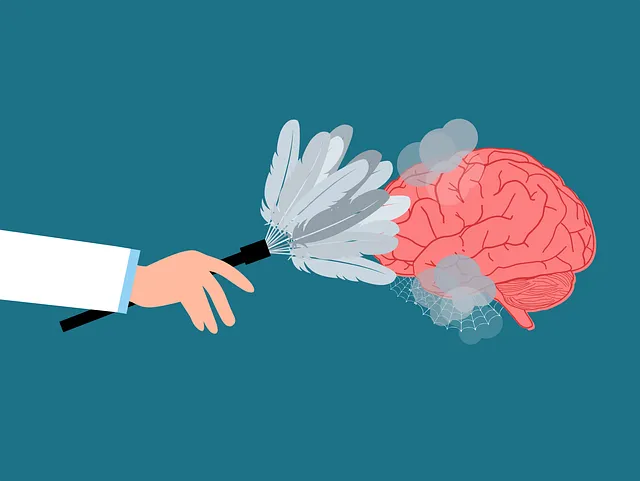Burnout among healthcare providers is a growing concern impacting well-being, patient care, and organizational performance. The pandemic has amplified stressors like long hours, high patient loads, and lack of control. Kaiser Permanente Denver's holistic burnout prevention strategy includes comprehensive training programs focusing on self-care, stress management, mental health awareness, and emotional intelligence. These tailored workshops, such as Mood Management and Mental Wellness Podcast Series, equip healthcare professionals with resilience and balanced lifestyle strategies, fostering a supportive work environment, improved job satisfaction, and enhanced care quality for diverse patient populations.
Healthcare provider burnout is a growing concern, impacting patient care and organizational success. This comprehensive guide explores effective strategies to prevent burnout among healthcare professionals. We delve into the root causes and symptoms, drawing insights from Kaiser Permanente Denver’s innovative approach. Discover how training programs foster resilience, and learn practical steps for creating supportive work environments. Additionally, we emphasize the vital role of self-care practices in maintaining wellness among healthcare providers, offering solutions inspired by industry leaders like Kaiser Permanente Denver.
- Understanding Burnout Among Healthcare Providers: Symptoms and Causes
- Kaiser Permanente Denver's Approach to Burnout Prevention
- The Role of Training Programs in Building Resilience
- Creating a Supportive Work Environment: Strategies for Healthcare Organizations
- Self-Care Practices for Healthcare Professionals: Taking Time for Wellness
Understanding Burnout Among Healthcare Providers: Symptoms and Causes

Burnout among healthcare providers is a growing concern, impacting not only individual well-being but also patient care and organizational performance. It’s essential to recognize that burnout isn’t merely feeling tired; it’s a complex state resulting from prolonged exposure to stressful work environments. Symptoms manifest in physical, emotional, and mental exhaustion, cynicism towards patients or colleagues, and feelings of detachment from one’s job.
Several factors contribute to this phenomenon. Long working hours, high patient loads, administrative burdens, and lack of control over work processes are significant causes. The unique demands of healthcare, especially during times of crisis like the pandemic, have amplified these stressors. Organizations like Kaiser Permanente Denver have responded with comprehensive training programs that focus on self-care practices and stress management workshops to combat burnout. Public Awareness Campaigns Development initiatives also play a crucial role in normalizing conversations around mental health within the industry, encouraging professionals to prioritize their well-being alongside patient care.
Kaiser Permanente Denver's Approach to Burnout Prevention

Kaiser Permanente Denver has implemented a comprehensive approach to burnout prevention, recognizing the profound impact on patient care and staff well-being. They prioritize mental health awareness by offering a range of training programs tailored to different roles within the organization. These programs focus on stress management, resilience building, and emotional intelligence, empowering healthcare providers with essential tools to navigate demanding work environments.
One key initiative is their Mood Management workshops, designed to help staff recognize and address early signs of burnout and depression. Through interactive sessions, providers learn coping strategies, mindfulness techniques, and self-care practices that promote a healthier work-life balance. Additionally, Kaiser Permanente Denver fosters a culture of open communication, encouraging staff to seek support from peers, mentors, or professional counseling services, ensuring that mental health concerns are addressed promptly.
The Role of Training Programs in Building Resilience

Healthcare provider burnout is a significant concern, but training programs, like those offered by Kaiser Permanente in Denver, play a pivotal role in building resilience among medical professionals. These programs are designed to equip healthcare workers with the necessary tools and skills to navigate the challenges of their roles, fostering mental well-being and decreasing stress levels. Through interactive workshops and educational sessions, providers gain strategies for managing workload, setting boundaries, and prioritizing self-care—crucial elements in preventing burnout.
Beyond technical knowledge transfer, these training programs often emphasize important aspects such as cultural sensitivity in mental healthcare practice and mental illness stigma reduction efforts. By addressing these areas, they enhance providers’ ability to connect with diverse patient populations, boost their confidence in managing complex cases, and create a more inclusive healthcare environment. The positive impact extends not only to individual practitioners but also to the overall quality of care delivered, ensuring that patients receive support tailored to their unique needs and backgrounds.
Creating a Supportive Work Environment: Strategies for Healthcare Organizations

Healthcare organizations play a pivotal role in fostering a supportive work environment that can mitigate burnout among providers. Strategies such as implementing comprehensive Kaiser Permanente training programs Denver have proven effective in enhancing staff resilience and overall job satisfaction. These initiatives often focus on mental wellness, incorporating modules on depression prevention and emotional intelligence development. By nurturing an atmosphere of open communication, recognition, and balanced workload distribution, healthcare institutions can create a safe space for professionals to thrive.
Additionally, encouraging team-building activities, providing access to counseling services, and promoting healthy work-life integration are integral parts of these interventions. Such measures not only strengthen the emotional connection among colleagues but also equip them with tools to navigate challenging situations effectively, ultimately contributing to a more positive and sustainable professional environment.
Self-Care Practices for Healthcare Professionals: Taking Time for Wellness

In the high-pressure world of healthcare, professionals often put their patients’ needs before their own, leading to burnout and mental health challenges. However, prioritizing self-care is essential for maintaining resilience and providing optimal patient care. Kaiser Permanente training programs in Denver emphasize the importance of taking time for wellness as a key strategy to combat burnout. These programs encourage healthcare workers to participate in regular physical activity, practice mindfulness techniques, and engage in activities that bring joy and relaxation.
The Mental Wellness Podcast Series produced by Kaiser Permanente offers valuable resources for depression prevention and burnout prevention, highlighting the significance of self-care practices. By incorporating these strategies into their daily routines, healthcare professionals can enhance their mental wellness, improve stress management, and cultivate a healthier work-life balance. Ultimately, these initiatives contribute to a happier and more sustainable career in healthcare.
Healthcare provider burnout is a pressing issue, but with the right strategies, it can be mitigated. By understanding the symptoms and causes, organizations like Kaiser Permanente Denver are leading the way in proactive approaches, such as comprehensive training programs that foster resilience. These initiatives, combined with supportive work environments and self-care practices, can revolutionize wellness within the healthcare sector. The evidence is clear: investing in these strategies not only benefits healthcare professionals but also improves patient outcomes and creates a more sustainable healthcare system.






